War in Ukraine: Is Belarus a co-aggressor?
Belarus has played a dual role in Russia’s war against Ukraine. On the one hand, Belarusian territory was used as a launching pad for Russia’s invasion in Ukraine, which greatly exacerbated the situation. On the other hand, thousands of Belarusian citizens stepped forward as volunteers and combatants, contributing to the fight for Ukraine’s freedom. The new short film by Voice of Belarus, Malanka Media and Viasna sheds light on this predicament.
In 2022, Russia has used the territory of Belarus to wage war against Ukraine with full knowledge and consent of Alexander Lukashenko’s regime. Following military exercises in early 2022, the Russian military crossed the state border and launched a devastating offensive on Kyiv on February 24. The Belarusian-Ukrainian border, serving as the shortest route to the Ukrainian capital, became the gateway for the invaders. Tragically, the Lukashenko regime, for an extended period, facilitated the use of Belarusian territory as a launching pad for missile attacks, further exacerbating the already dire situation in Ukraine.
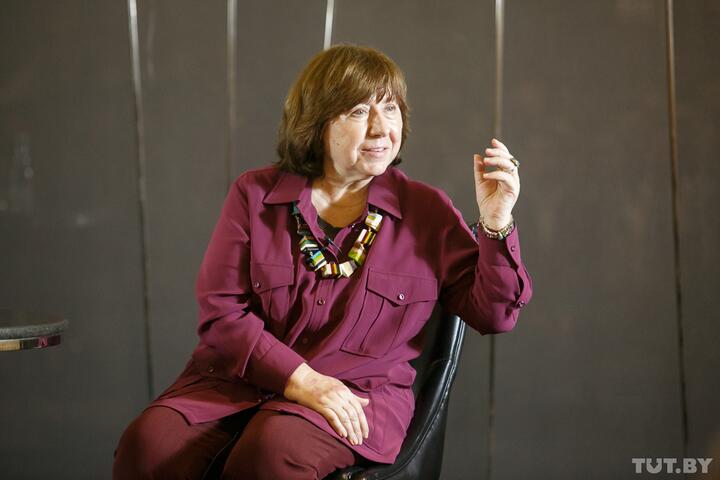
“Something incomprehensible has happened: the past has taken the lead, and it rules today. Old people rule us, their notions, what they have read, what they know has suddenly defeated us, those of us who want to live differently.”
Sviatlana Alexievich, Belarusian writer, Nobel laureate 2015
Following Putin, Lukashenko may soon be recognized as a war criminal for abducting Ukrainian children from occupied territories, which qualifies as genocide. Since the beginning of Russia’s invasion of Ukraine, Minsk forcefully brought over 2,150 children to Belarus with the active participation of the Belarusian Red Cross. In April, the Parliamentary Assembly of the Council of Europe acknowledged the actions as genocide and holds Alexander Lukashenko responsible for this crime. The International Criminal Court is called upon to consider the possibility of issuing a similar arrest warrant for Lukashenko.
Lukashenko cynically stated that “we participate there. We do not hide it. But we are not killing anyone. We are not sending our military anywhere”. However, many countries are extending some of the sanctions against Russia to Belarus for complicity in the aggression. Because of this, many Belarusians who were forced to flee the country from persecution by the dictator are facing problems with their residence permits and blocked bank accounts due to their citizenship, both in Ukraine and in the EU.
The democratic forces of Belarus are tirelessly working to make it clear to the world that the actions of the illegitimate ruler do not represent the will of the Belarusian people.
Sviatlana Tsikhanouskaya addressed the international community at the Warsaw Security Forum:
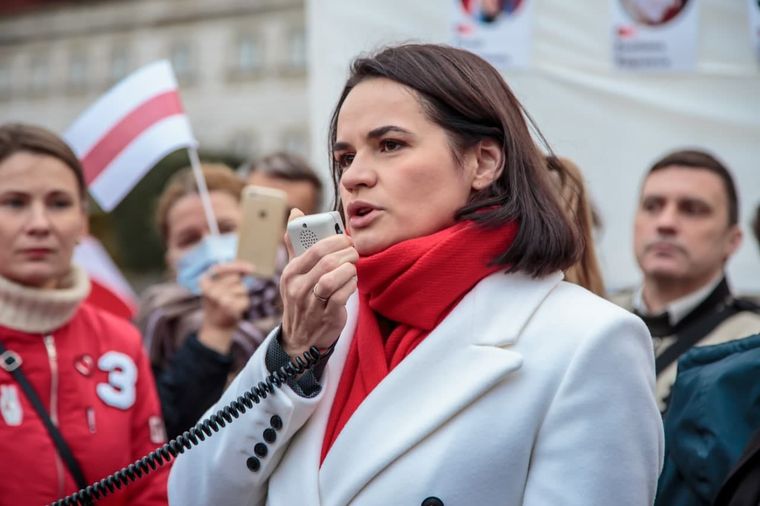
The world must stop thinking of Belarus as a part of Russia. We were a part of Europe many centuries before Russia came to Belarus. Respect and protection of pro-European Belarusians should be an integral part of Western policy. Belarusians oppose the Russian war in Ukraine, that is why I always say: you need to distinguish between the people and the regime. On the one hand, it is necessary to freeze the regime’s assets abroad and issue an arrest warrant for Lukashenko over the entire list of crimes he has committed. On the other hand, it is necessary to help people fleeing repression.
Since May 2022, Sviatlana Tsikhanouskaya’s representative office has been operating in Kyiv, establishing relations with the Ukrainian authorities and protecting the interests of Belarusians located in Ukraine. Before the war, there were about approximately 50 thousand of them in the country. Many fled but others stayed in the war-torn country and are helping as volunteers or fighting on the side of Ukraine. Today, Tsikhanouskaya’s representative office is the only institution representing Belarus in Ukraine. Lukashenko’s embassy left Kyiv immediately after the start of the war.
From the very beginning of Russia’s full-scale invasion of Ukraine, Belarusians have been actively demonstrating their anti-war stance by organizing marches and pickets, disrupting equipment on Belarusian railways to impede the transportation of Russian weapons, carrying out a daring drone attack on a Russian military aircraft, participating in the information war.
At least 1,630 Belarusians were detained for anti-war activities and statements.
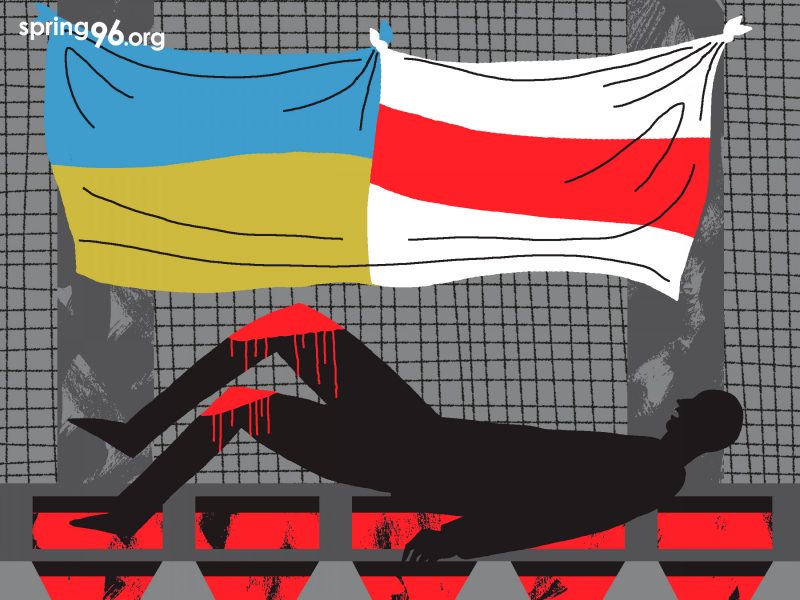
The largest mass anti-war protests throughout Belarus were on February 27 and 28, 2022, on the days of voting in the next “referendum”, invented by the dictator to change the constitution for the third time. People inscribed anti-war slogans on ballots, assembled near polling stations, and collectively voiced their disapproval of the situation in Ukraine. Spontaneous demonstrations erupted in cities, towns and villages, but were violently suppressed. Since then, a wide range of actions have resulted in imprisonment, such as displaying anti-war posters, using balloons, wearing yellow and blue attire, placing flowers and lanterns near the Ukrainian embassy, singing Ukrainian songs at a concert, and even listening to Ukrainian music at home.
The descendants of the partisans who sabotaged railways during the German occupation in World War II are mirroring their ancestors’ actions in present-day Belarus. Since the start of the full-scale invasion, Belarusians have been disrupting railway operations to hinder the transportation of military equipment. As of now, 13 individuals, known as “rail partisans,” have been handed a combined prison sentence of nearly 200 years.
The case of Vitaly Melnik, who was kneecapped during his arrest, gained widespread attention. The 40-year-old was charged with setting fire to an automatic relay cabinet on a railway track, which disabled the railway signaling system. He did not receive proper medical care in jail and is still using crutches to walk. Despite a glaring lack of evidence proving his guilt, he was sentenced to 13 years in prison.
Three men from Svetlahorsk – Dzianis Dzikun, Dzmitry Ravich and Aleh Malchanau – were accused of terrorism and treason as part of the “rail partisans” case. They were sentenced to 21, 22, and 23 years of imprisonment in a maximum security institution. So far, this is the most severe sentence for sabotage on the Belarusian railway.
In another form of anti-war resistance Belarusians throughout the country have been photographing Russian military equipment and sharing this information with the Belarusian Hayun project or independent media. This monitoring of Russian military activity has proved incredibly helpful to Ukrainian authorities and citizens, especially in the initial stages of the war. However, individuals providing this information are putting their freedom at stake, as they could face charges of “promoting extremist activities” or even “state treason” if they are apprehended.
From the first days of the war, Belarusian volunteer combatants took part in the most difficult battles in key areas as part of the Ukrainian army. They fought near Kyiv, in Hostomel, Butcha, Kherson, Lisichansk and Bakhmut.
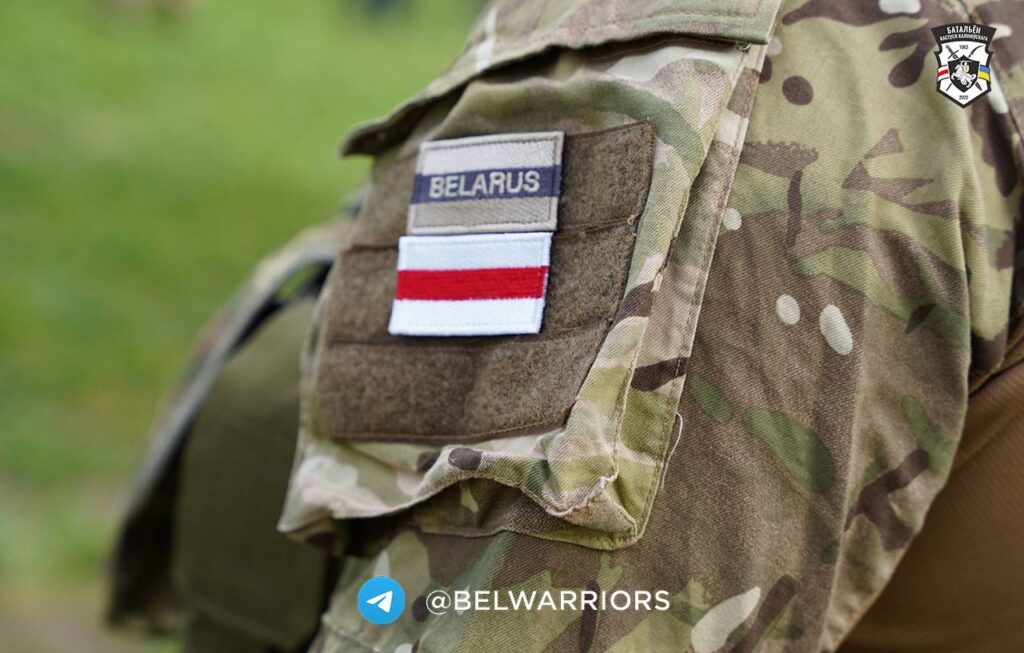
The largest military unit made up of Belarusian soldiers is the Kastus Kalinouski Regiment, which was integrated into the Ukrainian armed forces in 2022.
The name of Kastus Kalinouski, the leader of one of the most famous uprisings of Belarusians against the Russian Empire, frightens the regime so much that it recently declared the very phrase “Kastus Kalinouski Regiment” and all the regiment’s logos “extremist”. According to Radio Liberty, approximately 300 people are currently enlisted in the regiment. Some of them already fought on the Ukrainian side in 2014-2016, in Eastern Ukraine.
Some Belarusians fight as part of the Second International Legion and other units of the Ukrainian Armed Forces. In addition, since 2022 there has been a Belarusian Volunteer Corps, which has proclaimed the “de-occupation of Belarus and Ukraine” as its goal. For security reasons, the precise number of Belarusian volunteers in Ukraine is not disclosed. In many cases, the involvement of Belarusians only becomes known after their death in battle. Even then, their identities are not always revealed to prevent persecution of their relatives in Belarus, which can be severe. According to data from Slovo i Dilo, more than 40 Belarusians have lost their lives fighting for Ukraine, making them second only to Georgian fighters in this tragic tally.
Belarusian soldier Alexey Skoblya, call sign “Tur”, served in the Kastus Kalinouski Regiment. He died in the battles near Kyiv. Volodymir Zelensky honored him with the Hero of Ukraine title. Alexey has thus become the second Belarusian to be awarded the title of Hero of Ukraine. The first was Mikhail Zhyzneuski, who was killed during the Maidan protests in 2014.
Ukrainian streets have been named after the Belarusian Heroes of Ukraine. The Vilna Bilorus Foundation plans to create a museum in Bucha dedicated to Belarusian volunteers, for which their relatives and fellow soldiers are already donating their personal belongings.
With the outbreak of a full-scale war in Ukraine, Belarus’s dependence on Russia became even stronger. After the February 2022 “referendum”, the clause on the country’s nuclear-free status was removed from the Belarusian constitution, and in July 2023, the dictators of both countries announced that Russian nuclear weapons had already been brought to Belarus. In the event that such weapons are used, however unlikely it may be, Belarus will become a target for a retaliatory strike.
Belarusians are well aware that without Ukrainian victory no transformation in Belarus is possible. Vadzim Kabanchuk, deputy commander of the Kastus Kalinouski regiment, notes:
This is our war too, because our regiment’s motto is that we liberate Belarus through the liberation of Ukraine. In fact, we have the same enemy: the Putin regime and his puppet, the Lukashenko regime.
Volodymyr Zelensky sees the potential for a new era of cooperation and security in the region, He recently stressed:
“Russia will lose in this confrontation. After it has lost – and as a result – a historic chance for geopolitical stability along the entire line from Scandinavia through Minsk and Kiyv to the South Caucasus will be realized.”
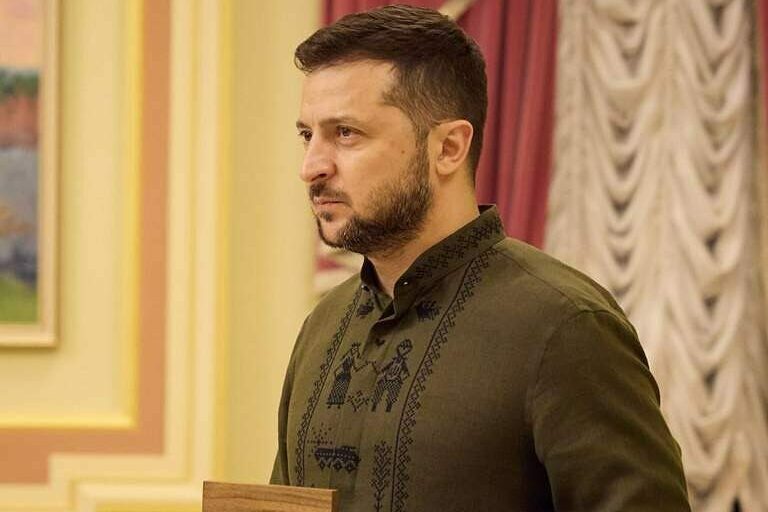
The destinies of Belarus and Ukraine are inextricably linked, like two branches of the same tree swaying in the winds of history. An independent and democratic Belarus will act as a protective shield, providing support for Ukraine in its struggle against external threats. By working together, the two countries can make an invaluable contribution to a more secure and resilient Europe.